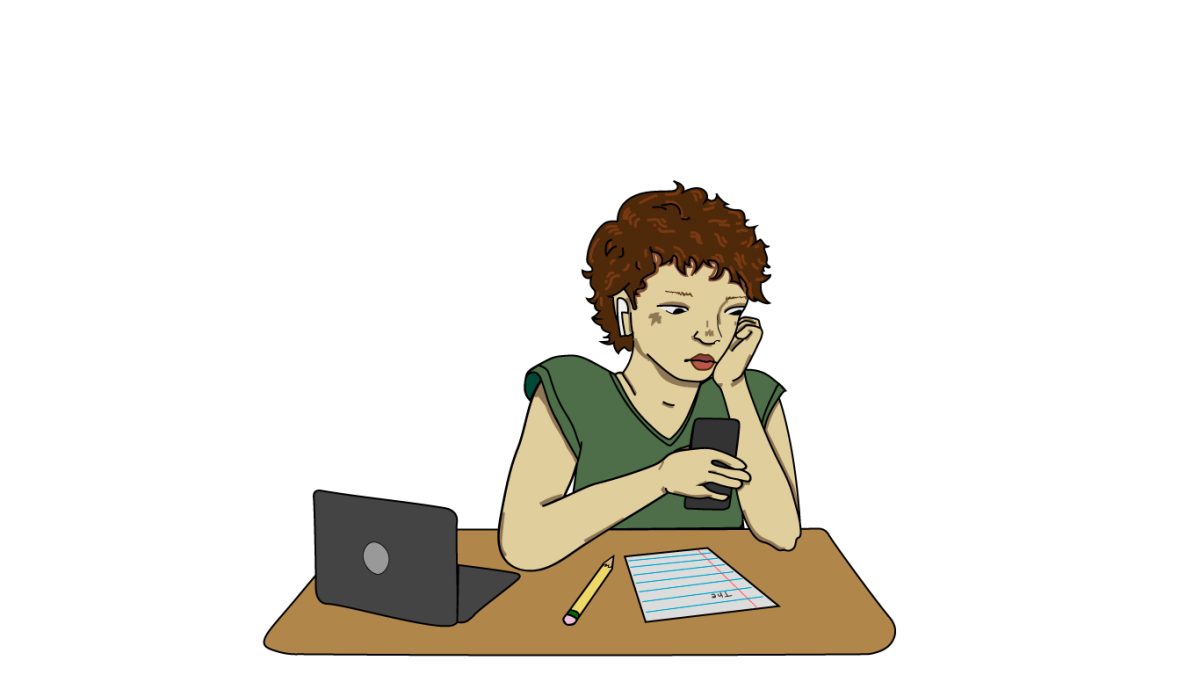COVID-19 significantly hurt students academically, causing less content to be covered in classes. Spanish teacher Rebecca Lewis (she/her) said that she had to cut extreme amounts of content in the curriculum during the pandemic, which affected students in their following years of learning Spanish since they hadn’t learned everything they were expected to.
“We had really watered-down grading expectations, and so we had kids that were going on to the next level that shouldn’t have,” Lewis said.
After COVID-19, there was also an adjustment in teachers accepting late work. Biology teacher Beth Stewart (she/her) said that before COVID-19, she wouldn’t accept any late work, and that teachers didn’t have late work policies. Now, students get a “grace day,” where they get one extra day for late work to be accepted.
“I used to have no missing assignments in IB Bio. None. And now, students definitely take advantage of late deadlines,” Stewart said.
Lewis agrees that students have taken advantage of these deadlines and said that she can’t keep up with the constant flow of late assignments.
“When it comes to grading late work and retakes for everything, I feel like we’ve done a disservice to the students. I feel like we’ve lowered the expectations, we’ve lowered the bar, and for the average student, I don’t think that’s a good thing,” Lewis said.
On the other hand, freshman Vera Fang (she/her) went through online school during her sixth grade year and said that attending school in-person is much more challenging and that she feels she is now expected to do more work.
“I didn’t start developing a studying method or anything like that, and when I got into seventh grade, I barely knew how to study and for the first semester of geometry, I would get C’s and B’s on tests,” Fang said.
Fang believes that the reason she had struggled to focus on her studying was due to the influence of technology during online-learning.
“All of us were playing video games and watching YouTube, and our attention spans have grown to be pretty bad,” Fang said.
Aside from academics, COVID also changed the social atmosphere. Directly after the pandemic, students struggled with interacting with each other in classes.
“Typically, at the beginning of the school years, students sit down, and they start having conversations with the people around them,” Stewart said. “That did not happen. Everyone came in, and they just kind of sat there, and they all got on their phones, because the phone was the only way they knew to be in a group of people and look like they had something to do. There was very little conversation.”
Stewart also has noticed how technology has impacted how students approach their work. She said it’s caused students to become less social and less willing to ask their peers for support, leading to a lack of creativity.
“I feel like students want to Google Search everything, and then lift some answer out of Google and stick it on their paper, more so than critically thinking about how they would answer a question,” Stewart said.
Fang said that the reliance students have on the internet is caused by the addiction they have to their phones, due to their online exposure during COVID. As a result, people have come to rely on the internet.
“We are so addicted to social media and online stuff because of the stuff we were exposed to during the COVID years,” Fang said. “Everyone was only able to interact with each other online.”
Stewart said that before COVID, students were more capable at confronting challenges, whereas now, they give up the moment they feel that they can’t do it right.
“It’s taken a really long time to encourage students and adults that it’s okay for things to be difficult. You can do difficult things, and that it’s good to do difficult things.”
Stewart said that cheating during COVID caused students to lack perseverance, hurting them in the long run. Fang added that many students have become desensitized to cheating in classroom tests due to the pandemic.
“It was definitely easier to cheat back then. And I feel like probably a lot of students cheated. That’s just my assumption,” Fang said. “And that probably got them into the habit of cheating, which meant that when they got back to school, it was pretty sudden, and they probably couldn’t get used to it.”
Junior Amelia Virgen (she/her) said that normalization of cheating during COVID caused many to be worse at studying and made them lazy in their online classes. She said that high school is not what she had expected it to be.
“I thought high school was gonna be hard. But with all the amount of homework, I feel like they toned it down somehow from COVID.” Virgen said.
While students were not as socially proficient at in the years following COVID, Stewart said that in the past year, behaviors have returned to normal.
“We just also need to recognize we can still hold kids to high expectations. We can build that community and make it the place where they want to be, but we need to also treat them like the little mini-adults that we’re sending off into the world,” Lewis said.











